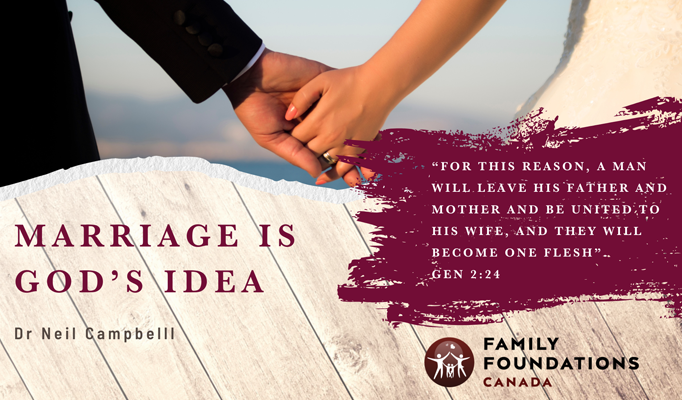
For many today, marriage is seen as a nice tradition – but not a necessity. Research consistently shows that strong marriages contribute to health, happiness, and thriving communities. Yet rather than fostering good marriages, society often dismisses the institution altogether.
Marriage is the foundation of a strong and stable society, providing essential benefits to families, communities, and individuals. A healthy marriage fosters financial stability, as two committed partners can pool resources, build wealth, and provide a secure environment for raising children. Emotionally, marriage offers deep companionship, support, and a sense of belonging, reducing loneliness and promoting mental well-being. Spiritually, marriage reflects God’s divine plan – a sacred covenant where two become one flesh, raising children in a stable, faith-filled home to follow in His ways. Easy and accessible divorce laws in Canada have weakened family bonds, leaving many, especially children, with feelings of abandonment and insecurity. Rather than treating marriage as a disposable arrangement, society and the church must recognize its vital role and work to restore its value, honouring God’s design for lifelong commitment and generational stability.
My wife, Annette and I recently taught a Marriage Encounter Workshop. The first session lays out that the foundation of marriage as a covenant between a man and a woman before God. Genesis 2:24 says, “A man shall leave his father and mother and be joined to his wife, and they shall become one flesh.” This one flesh union is more than physical – it’s a deep, spiritual, and lifelong covenant of commitment and faithfulness.
So, what is marriage? A contract or a covenant? A contract marriage is based on limited liability, meaning, “As long as you keep your end, I’ll keep mine.” In contrast, a covenant marriage is an unlimited commitment, declaring, “Regardless of how you treat me I will never leave you or forsake you.” A contract includes loopholes that allow an exit when things get tough, while a covenant remains steadfast, saying, “No matter what, I stand on my promise to you.” Contract marriages often use terms like, “As long as we both shall continue to love,” whereas a covenant is grounded in the vow, “Till death do us part.” A commitment to a ‘covenant marriage’ is self-less and brings us to a place where we need to die to ourselves – sometimes even daily. This conforms us into Christlikeness.
Unfortunately, many have abandoned the covenant of their youth (Malachi 2:14), replacing it with contract language that weakens the true meaning of marriage. Both inside and outside the church, the value of marriage has been disregarded, with many choosing to live in common-law relationships or other arrangements instead of embracing the lifelong covenant God designed. Covenant marriage is a profound picture of Christ, the Groom, and the Church, His bride. In Ephesians 5:25, Paul writes, “Husbands, love your wives, just as Christ also loved the church and gave Himself for her.” This illustrates how marriage is not just a human institution but a divine reflection of Christ’s sacrificial love. Just as Jesus gave His life for the Church, a husband is called to love, protect, and lead his wife selflessly.
Similarly, the Church responds to Christ with love, respect, and submission. A wife is called to honour and support her husband (Ephesians 5:22-24). This covenant is not based on convenience or conditions but on an unbreakable commitment – just as Christ promises to never leave or forsake His bride (Hebrews 13:5).
Covenant isn’t just a promise – it’s a lifelong, unbreakable commitment, valid at least until death. Unlike a contract, which depends on both parties holding up their end, a covenant is a personal vow made before God, regardless of the other person’s actions. When marriage is built on covenant, it creates deep security – not just for the couple but for their children. In this safe, committed environment, spouses can be their true selves, and children can grow confidently into who God created them to be. God designed marriage to reflect His perfect love, but we live in a broken world where relationships don’t always go as planned. The good news? It’s never too late to establish a covenant mindset. If you’ve fallen short, repent, learn from the past, and fully commit to the marriage you’re in today. Covenant is God’s way – and it’s the foundation of a love that lasts.
God doesn’t hate divorced people – He hates what divorce does to families. Divorce breaks the hedge of protection around a family, opening the door for the enemy to come in and wreak havoc. The enemy comes to rob, kill, and destroy. He is after our generations – the lives of our children and children’s children. We tell young couples all the time: the enemy isn’t primarily concerned about your marriage itself. What he’s after is your generations. He knows that if you separate and each go your separate ways, you’ll likely find someone else to make you happy for a time. But what he really wants is to tear apart the covenant, gaining free access to your children. That’s why we fight so hard for every marriage to thrive and for children to be raised in godly homes. The lie that divorce is better for the children is exactly that – a lie. The statistics are heartbreaking, showing the devastating impact divorce has on the lives of children.
If you’re facing tough times in your marriage, the best thing you can do for your children is to stay together. Many years ago, a survey by Focus on the Family found that whether the respondents were Christian or secular, when asked about the most important things they wanted in life, the answer was the same: “a good marriage and good kids.”
So, stand for your covenant, fight for each other, not with each other. Later this month, we’ll be sharing some practical tools on how to improve communication and build a healthier, stronger marriage.

Leave a Reply